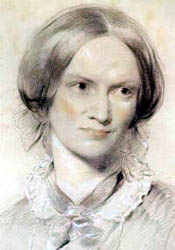
Jane Eyre:
"Jane Eyre, who had been an ardent, expectant woman--almost a bride--was a cold, solitary girl again: her life was pale; her prospects were desolate. A Christmas frost had come at midsummer; a white December storm had whirled over June; ice glazed the ripe apples, drifts crushed the blowing roses; on hay-filed and corn-field lay a frozen shroud: lanes which last night blushed full of flowers, to-day were pathless with untrodden snow; and the woods, which twelve hours since waved leafy and fragrant as groves between the tropics, now spread, waste, wild, and white as pine-forests in wintry Norway" (260 Norton--Chapter 26).
"Some time in the afternoon I raised my head, and looking round and seeing the western sun gilding the sign of its decline on the wall, I asked, 'What am I to do?'" (261, chap. 27).
"'No, Jane,' he returned: 'what necessity is there to dwell on the Past, when the Present is so much surer--the Future so much brighter?'" (277, chap. 27).
Shirley:
Chapter 22--Two Lives
"At last, however, a pale light falls on the page from the window: she looks, the moon is up; she closes the volume, rises, and walks through the room. Her book has perhaps been a good one; it has refreshed, refilled, rewarmed her heart; it has set her brain astir, furnished her mind with pictures. The still parlour, the clean hearth, the window opening on the twilight sky, and showing its 'sweet regent', new throned and glorious, suffice to make earth an Eden, life a poem, for Shirley. A still, deep, inborn delight glows in her young veins; unmingled--untroubled; not to be reached or ravished by human agency, because by no human agency bestowed: the pure gift of God to His creature, the free dower of Nature to her child. This joy gives her experience of a genii-life. Buoyant, by green steps, by glad hills, all verdure and light, she reaches a station scarcely lower than that whence angels looked down on the dreamer of Beth-el, and her eye seeks, and her soul possesses, the vision of life as she wishes it. No--not as she wishes it; she has not time to wish: the swift glory spreads out, sweeping and kindling, and multiplies its splendours faster than Thought can effect his combinations, faster than Aspiration can utter her longings. Shirley says nothing while the trance is upon her--she is quite mute."
"If Shirley were not an indolent, a reckless, an ignorant being, she would take a pen at such moments; or at least while the recollection of such moments was yet fresh on her spirit: she would seize, she would fix the apparition, tell the vision revealed. Had she a little more of the organ of Acquisitiveness in her head--a little more of the love of property in her nature, she would take a good-sized sheet of paper and write plainly out, in her own queer but clear and legible hand, the story that has been narrated, the song that has been sung to her, and thus possess what she was enabled to create. But indolent she is, reckless she is, and most ignorant, for she does not know her dreams are rare--her feelings peculiar: she does not know, has never known, and will die without knowing, the full value of that spring whose bright fresh bubbling in her heart keeps it green."
"So do nuns--with their close cell, their iron lamp, their robe strait as a shroud, their bed narrow as a coffin. She says, often, she has no fear of death--no dread of the grave: no more, doubtless, had St Simeon Stylites, lifted up terrible on his wild column in the wilderness: no more has the Hindoo votary stretched on his couch of iron spikes. Both these having violated nature, their natural likings and antipathies are reversed: they grow altogether morbid."
The Professor:
"I stood awhile, leaning over a wall; and looking down at the current: I watched the rapid rush of its waves. I desired memory to take a clear and permanent impression of the scene, and treasure it for future years. Grovetown Church clock struck four; looking up, I beheld the last of that day's sun, glinting red through the leafless boughs of some very old oak trees surrounding the church--its light coloured and characterized the picture as I wished. I paused yet a moment, till the sweet, slow sound of the bell had quite died out of the air; then ear, eye, and feeling satisfied, I quitted the wall and once more turned my face towards X----" (34).
"This is Belgium, reader. Look! don't call the picture a flat or a dull one--it was neither flat nor dull to me when I first beheld it" (42). "What did I see?", Crimsworth asks himself on entering Belgium, and his answer reveals an artists view of a scene: "Green, reedy swamps; fields fertile, but flat, cultivated in patches that made them look like magnified kitchen-gardens; belts of cut canals, gliding slow by the roadside; painted Flemish farmhouses; some very dirty hovels; a grey, dead sky; wet road, wet fields, wet house-tops: not a beautiful, scarcely a picturesque object met my eye along the whole route; yet to me, all was beautiful, all was more than picturesque" (43).